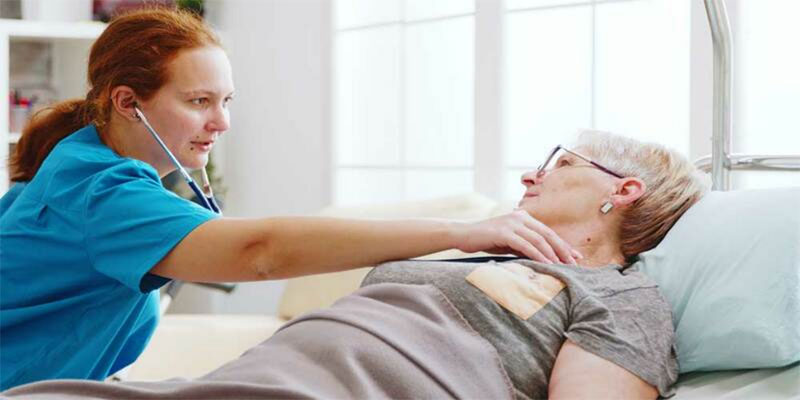Cholesterol levels rise during and after Menopause because estrogen production slows down. A waxy molecule called cholesterol floats around in your blood. High cholesterol levels are associated with the development of fatty deposits in the blood arteries and an increased risk of cardiovascular disease, even though cholesterol is essential for cell growth and repair in the body. Over time, the accumulation of these deposits restricts blood flow via the arteries. Such deposits may spontaneously liquefy and form a clot, leading to a heart attack or a stroke.
How Menopause Makes Cholesterol Levels Rise

It is possible to inherit a propensity to have high cholesterol, but the majority of cases of high cholesterol can be prevented or managed by choosing healthier food choices. A low-fat diet, regular exercise, and, in certain situations, cholesterol-lowering medicine are all effective ways to bring down high cholesterol levels. But researchers in the United States have discovered that women's cholesterol levels skyrocket when their periods end, which may be a factor in why menopausal women have a higher risk of developing cardiovascular disease after the change in their monthly cycles.
Postmenopausal women have been thought to have an elevated risk of cardiovascular disease for a considerable amount of time by specialists in the medical field. According to the findings of a study that was presented at the annual meeting of the American College of Cardiology and published in the Journal of the American College of Cardiology, a dramatic increase in cholesterol levels is caused not by the natural aging process but by menopause. It seems that all women, regardless of their ethnic background, are the same in this regard.
Professor of Psychiatry as well as Epidemiology at the University of Pennsylvania, Karen A. Matthews, PhD, as well as her colleagues tracked 1,054 American women while they went through Menopause and thereafter. Many women, as they approach menopause, have a dramatic rise in cholesterol levels, according to Matthews. Participants' serum glucose, insulin, and also other cardiovascular disease risk factors were monitored on a yearly basis.
The Role Of Menopause
All women eventually experience Menopause, which happens when the ovaries cease generating oestrogen (a female hormone) owing to the decrease and cessation of egg growth and ovulation (a female reproductive process necessary for the generation of oestrogen and progesterone). Menopause often occurs between the ages of 51 and 55, depending on variables such as heredity, diet, smoking, and the age at which a woman first experiences menstruation. Alterations associated with reduced estrogen levels may begin many years before oocyte quality and quantity diminish.
A lack of estrogen may cause immediate, intermediate, and eventual health issues. Early menopause symptoms include hot flashes, evening sweats, sleeplessness, and mood swings are well-known and well-accepted. Vaginal dryness, irritation, pain, and changes in bladder function are typical intermediate symptoms that are progressively being reported and treated more often than hot flushes. Menopause has a well-known and widely discussed long-term impact on the bones, including the loss of bone strength (and ultimately osteoporosis) and the increased risk of fracture due to reduced oestrogen. However, the significant long-term consequences of Menopause on the cardiovascular system are highly underappreciated.
What Exactly Is The Relationship Between Menopause And Cholesterol?

Cholesterol levels tend to rise during and after Menopause. A 2018 studyReliable Source confirms that sex hormones like estrogen provide some protection against heart disease before Menopause. And a 2020 studyReliable Source discovered that postmenopausal levels of total cholesterol, LDL cholesterol, and triglycerides were significantly higher than premenopausal levels. Each person's levels of good (HDL) cholesterol went down.
As a critical metabolic organ, the liver breaks down dietary fats such as fatty acids, triglycerides, and cholesterol into energy. Estrogen has a role in controlling the liver's lipid metabolism. This causes a rise in LDL cholesterol and triglycerides during Menopause. Experiencing this reduction in estrogen levels at an earlier age may raise some health risks. As reported by the Australasian Menopause Society, women who go through Menopause at an earlier age than their peers are at increased risk for cardiovascular disease.
Conclusion
The majority of us ring in the new year with a flurry of exciting (and frequently hectic) parties, feasts, and celebrations. These events mark the passing of the old year and the beginning of the new year. For a variety of causes, including some that may be avoided, the months of December and January have long been considered by medical professionals to be the most dangerous months for cardiac problems. You may be able to avoid ticker trouble this year by following the tips that were discussed earlier.

Daily Harvest: A Dietitian's Sincere Analysis
Dec 20, 2023

5 Anxiety-Reducing Breathing Exercises
Feb 28, 2024

What Causes The Ache In Your Arm After Getting A Flu Shot?
Nov 19, 2023

How to cope with the stress of social isolation: A Complete Guide
Oct 15, 2024

High-Fat Foods That Are Good For Your Health
Nov 07, 2023

The Cause Of Our Constant Sneezing
Oct 26, 2023

Supplementing Your Diet with Cholesterol-Lowering Foods
Feb 04, 2024

The Top Bodyweight Workouts You Can Perform At Home
Dec 14, 2023



